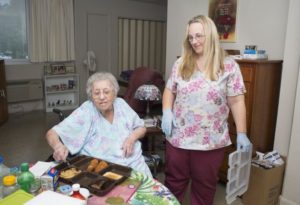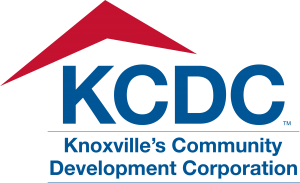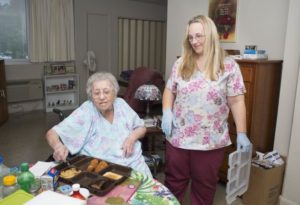This article originally appeared in the Knoxville News Sentinel on December 1, 2015.

Housekeeper Paula Spence, right, delivers dinner to Northgate Terrace resident Frieda Dixon last week. The Manor at Northgate Terrace program serves low-income seniors who can live independently with some help, but its coordinator says its costs are outpacing its budget. (PAUL EFIRD/NEWS SENTINEL)
Frieda Dixon worked hard throughout her life, on factory lines, at florists, store counters, rest homes, in a chicken packing plant — “I’ve done everything,” Dixon said.
But none of these jobs left Dixon, 83, well-off. For several years, she lived alone in a comfortably modest Maynardville apartment.
Then three years ago, Dixon started to need a wheelchair. Her doctor told her she would need knee replacement surgery to get her mobility back. At 80, Dixon said, “I’m too old to have surgery.”
“I was crippled up and couldn’t take care of myself,” she said, but she didn’t need the skilled care nursing homes offer, and an assisted-living facility was financially out of the question.
A cousin told Dixon’s daughter about the Manor at Northgate Terrace, two floors of supportive services for seniors 60 and older in KCDC’s high-rise apartment building where rent is on an income-based sliding scale.
“They can have their own (belongings), own bathroom, own heat, and be independent,” Dixon’s daughter, Carolyn Worsham, said. “That’s what we were wanting.”
Teresa Lawson, supportive services coordinator at the Manor for 13 years, said she has 41 residents with variations on Dixon’s story. Some lived alone and needed more help. Some were in assisted-living but ran out of money. Some were living with family; some were homeless. Most had no other options.
The Manor began in 1987 at KCDC’s Isabella Towers. There, staff noticed a handful of seniors “needed some help,” Lawson said. The program moved to Northgate Terrace, off Broadway near Fountain City, in the early 2000s, after KCDC renovated the 1969 high-rise with new heat and air and senior-friendly amenities.
There are 274 apartments in the building, which is limited to those 62 and older unless there’s no waiting list; then eligibility can include people 50-62 who have a disability. But only the second and third floors are the Manor, where residents pay a $515 monthly service fee that covers: two meals daily delivered; weekly cleaning and laundry services; a 24-hour emergency call system; being checked on twice daily; and on-site case management.
The problem, Lawson said, is the cost of those services is closer to $600 a month.
KCDC has raised the fee twice in the Manor’s history: from $460 to $495 in 1999, and to $515 in 2013.
“I sat down and pulled the income and expenses of each of our residents and crunched the numbers” in 2013, Lawson said. “If we had gone above $515, we probably would have lost a third of our residents, because they couldn’t afford it anymore.”
Lawson said KCDC bids out services, and “we’ve been very fortunate to get some good partnerships with people who will make it as cheap as possible. … They know that we make no profit.”
Nearby Shoney’s delivers meals, and Goodwill Industries provides staff for light housekeeping and laundry. Lawson draws the $75-per-resident monthly deficit from the program’s reserve fund, which was at $147,259 at the end of this fiscal year. She estimates that, if donations stay the same, the reserve fund can keep the Manor going about another three years.
Right now, donations come mainly from churches and individuals, including many KCDC employees who have money automatically deducted from their paychecks. The Manor’s biggest fundraiser is an annual“block party,” at which it sells food and rents vendors space. Three Rivers Market also twice made the Manor a beneficiary of its Round Up charitable giving program, netting a combined $6,300.
The program does not qualify for many grants because it’s not a 501(c)3, Lawson said, although “we’re connected to a governmental agency, so (donors) can still get a tax deduction. But anything they donate goes to our residents.”
Lawson wants to raise both money and awareness for the Manor, where many residents stay until the end of their lives. She currently has eight people on the waiting list.
“I get calls from families all the time who say, ‘I didn’t know you existed,’” Lawson said. “A lot of people don’t think about it until they need it.”
If it closes, she said, nothing else like it exists: “We really fill a gap.”
Nancy Wheeler’s father lived out his later years at the Manor, and her brother, Dale O’Bryen, who has physical and development disabilities, lives there now, she said.
“It’s so wonderful for me to know that he is in a safe environment, that he lives independently but has someone right there if he needs assistance,” she said.
She said her brother, who uses a motorized scooter, takes the path to Northgate Plaza shopping center. Without the Manor, “it would be impossible” for him to live independently with the services he needs, she said. “His income is nowhere near enough.”

